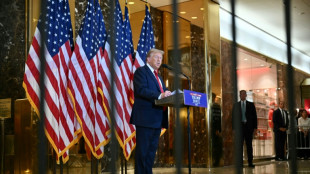
-
 ECB chief backs bank mergers amid UniCredit, Commerzbank talk
ECB chief backs bank mergers amid UniCredit, Commerzbank talk
-
China stocks soar on stimulus, but US and Europe retreat

-
 100 dead in storm Helene damage, flooding across US southeast
100 dead in storm Helene damage, flooding across US southeast
-
China stocks soar on stimulus, Europe slides on automaker woes

-
 German antitrust watchdog steps up monitoring of Microsoft
German antitrust watchdog steps up monitoring of Microsoft
-
Nepal's urban poor count cost of 'nightmare' floods

-
 E.Guinea, Gabon clash at ICJ over oil-rich islands
E.Guinea, Gabon clash at ICJ over oil-rich islands
-
New blow for UK's Starmer as growth data disappoints

-
 China's top banks to tweak mortgage rates to boost housing market
China's top banks to tweak mortgage rates to boost housing market
-
Muslim women break taboos navigating east London's waterways

-
 Nepal dam-building spree powers electric vehicle boom
Nepal dam-building spree powers electric vehicle boom
-
More than 60 dead from storm Helene as rescue, cleanup efforts grow

-
 Dozens missing, 9 dead in migrant boat wreck off Spanish Canaries
Dozens missing, 9 dead in migrant boat wreck off Spanish Canaries
-
Death toll from Hurricane John hits eight in Mexico

-
 Storm Helene's toll rises as rescue and cleanup efforts gain pace
Storm Helene's toll rises as rescue and cleanup efforts gain pace
-
SpaceX launches mission to return stranded astronauts

-
 Storm Helene kills 44, threatens more 'catastrophic' flooding as cleanup begins
Storm Helene kills 44, threatens more 'catastrophic' flooding as cleanup begins
-
SpaceX set to launch mission to return stranded astronauts

-
 Storm Helene kills 44, threatens more 'catastrophic' flooding
Storm Helene kills 44, threatens more 'catastrophic' flooding
-
Boeing strike grinds on as latest talks fail to reach agreement

-
 Iran 'news' sites, hackers target Trump ahead of US election
Iran 'news' sites, hackers target Trump ahead of US election
-
US ports brace for potential dockworkers strike

-
 Japan's speedy, spotless Shinkansen bullet trains turn 60
Japan's speedy, spotless Shinkansen bullet trains turn 60
-
US hurricane deaths rise to 44, fears of more 'catastrophic' flooding

-
 Global stocks mostly rise, cheering Beijing stimulus
Global stocks mostly rise, cheering Beijing stimulus
-
Europe en route for Moon with new simulator, says astronaut Pesquet

-
 Fireworks forecast if comet survives risky Sun flypast
Fireworks forecast if comet survives risky Sun flypast
-
Argentina judge orders dictionary to delete pejorative definition of 'Jewish'

-
 Global stocks rise on rate hopes, Beijing stimulus
Global stocks rise on rate hopes, Beijing stimulus
-
S.African woman turns 118, among the oldest in the world

-
 UK clears $4 bn AI partnership between Amazon, Anthropic
UK clears $4 bn AI partnership between Amazon, Anthropic
-
Barca fans barred from Champions League away game over racist banner

-
 Chinese stocks extend surge, Europe higher on Beijing stimulus
Chinese stocks extend surge, Europe higher on Beijing stimulus
-
Pope says Church must 'seek forgiveness' for child sexual abuse

-
 China caps week of 'bazooka' stimulus for ailing economy with rate cut
China caps week of 'bazooka' stimulus for ailing economy with rate cut
-
Cuts, cash, credit: China bids to jumpstart flagging economy

-
 France's debt weighs heavier ahead of budget debate
France's debt weighs heavier ahead of budget debate
-
Iran treads carefully, backing Hezbollah while avoiding war

-
 Return to sender: waste stranded at sea stirs toxic dispute
Return to sender: waste stranded at sea stirs toxic dispute
-
'Broken' news industry faces uncertain future

-
 On remote Greek island, migratory birds offer climate clues
On remote Greek island, migratory birds offer climate clues
-
Taken from mother by nuns, victim seeks answers as pope visits Belgium

-
 China cuts amount banks hold in reserve to boost lending
China cuts amount banks hold in reserve to boost lending
-
Hong Kong, Shanghai extend surge as China optimism boosts markets

-
 Vietnam president reiterates support for Cuba during official visit
Vietnam president reiterates support for Cuba during official visit
-
Drought reduces Amazon River in Colombia by as much as 90%: report

-
 Stay or go? Pacific Islanders face climate's grim choice
Stay or go? Pacific Islanders face climate's grim choice
-
Florida bracing for 'unsurvivable' Hurricane Helene

-
 Poverty rises to over 52 percent in Milei's Argentina
Poverty rises to over 52 percent in Milei's Argentina
-
Chloe's see-through look may not be for Kamala Harris


US recession fears grow as Fed plots aggressive course
The Federal Reserve has made clear it will come out guns blazing to battle the highest inflation rate in four decades, but that has sparked increasing fears their campaign will plunge the world's largest economy into recession.
The US central bank is facing a daunting task as it tries to engineer a "soft landing" that preserves growth while tamping down worrying price pressures against an uncertain global backdrop.
It will require "exquisite calibration," longtime Fed watcher David Wessel told AFP.
The United States has roared back from the Covid-19 pandemic, posting solid growth and record job gains thanks to massive government aid and aggressive stimulus from the Fed, which cut the benchmark lending rate to zero in March 2020.
But the rebound has hit multiple stumbling blocks, including renewed waves of the virus and shortages of key supplies and workers that sent prices surging. It must also now navigate the fallout from the war in Ukraine, which has caused a jump in oil prices.
The Fed last month raised interest rates by a quarter point in the first of a series of increases, and since then a chorus of officials -- including Fed Chair Jerome Powell and Governor Lael Brainard -- have signaled their openness to half-point rate increases, a more aggressive measure.
Wessel, director of the Hutchins Center on Fiscal and Monetary Policy at the Brookings Institution, cautioned that the Fed's tough stance means policymakers are "more likely to overdo it than under do it."
The Fed was caught by surprise at the speed with which inflation spiked late last year, initially driven by prices for cars and housing before spreading into other categories.
Consumer prices jumped 7.9 percent in February, the highest annual increase since 1982, but spending has nonetheless remained robust even amid new coronavirus variants.
Higher borrowing costs work by dampening consumer and business spending, bringing demand more in line with supply to lower prices.
Red-hot housing demand has already cooled as mortgage rates rose in anticipation of the Fed hikes, and data this week from the Mortgage Bankers Association indicate lenders are tightening credit availability.
- 'Very careful' -
Global stock markets have sagged in recent days amid the tough talk from Fed officials -- including from Brainard, who this week called fighting inflation "paramount."
Economists agree the Fed's stance is appropriate to prevent high inflation from becoming embedded, eroding purchasing power and eating into recent wage gains.
The situation raises the specter of the 1980s, when a wage and price spiral and oil embargo from OPEC member states prompted then-Fed chief Paul Volcker to crank up interest rates, which ground down inflation but caused a recession.
But Dana Peterson, chief economist at The Conference Board, said the current situation is "very different," notably because the economy and labor market are strong, and the Fed has built up its inflation-fighting credibility.
While the recession angst is understandable, "We need to give the Fed some credit," Peterson told AFP.
Policymakers are looking at all the factors "and really want to calibrate this" to achieve a soft landing, and she predicted the Fed "will do everything in its power, not to 'go too far.'"
But she cautioned that the central bank cannot control the supply shocks that have hit the economy, including the ongoing pandemic.
- Offloading bond holdings -
Economists are expecting several rate hikes this year and next, including multiple half-point increases, with the first of those likely coming in early May when the policy-setting Federal Open Market Committee (FOMC) next meets.
The Fed also has another tool to deploy this time, which is to reduce their massive bond holdings built up during the pandemic that were meant to ensure financial markets had ample cash to support the economy.
The minutes of last month's FOMC meeting released Wednesday indicated the $9 trillion balance sheet could be reduced by $95 billion a month, a much faster pace than in the wake of the 2008 global financial crisis.
But as an untested policy tool, it is unclear how that will interact with rate hikes.
"It's tricky," Wessel said, but given the strength of the economy "a mild and short recession... might be a tradeoff that policymakers are willing to make" to vanquish inflation.
Y.Ibrahim--CPN
